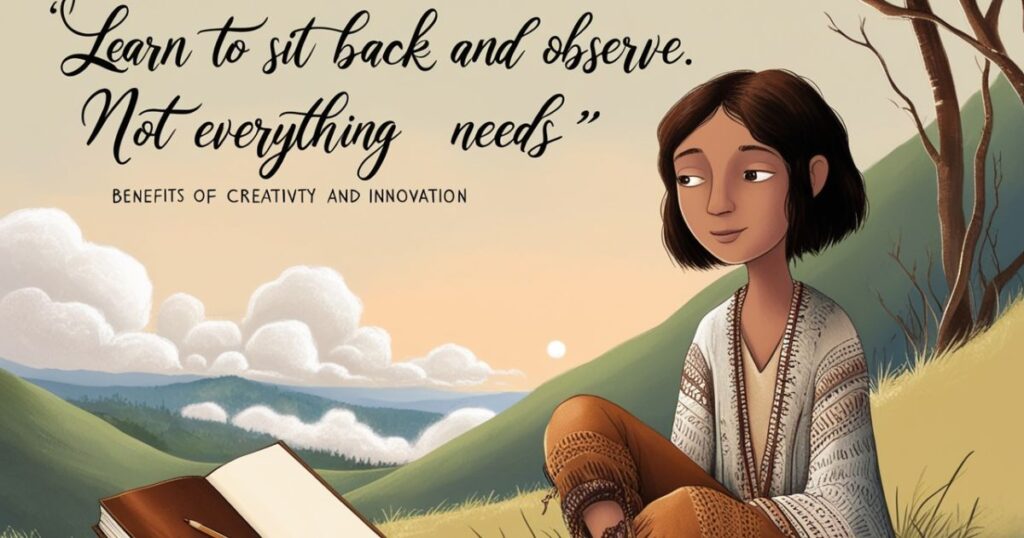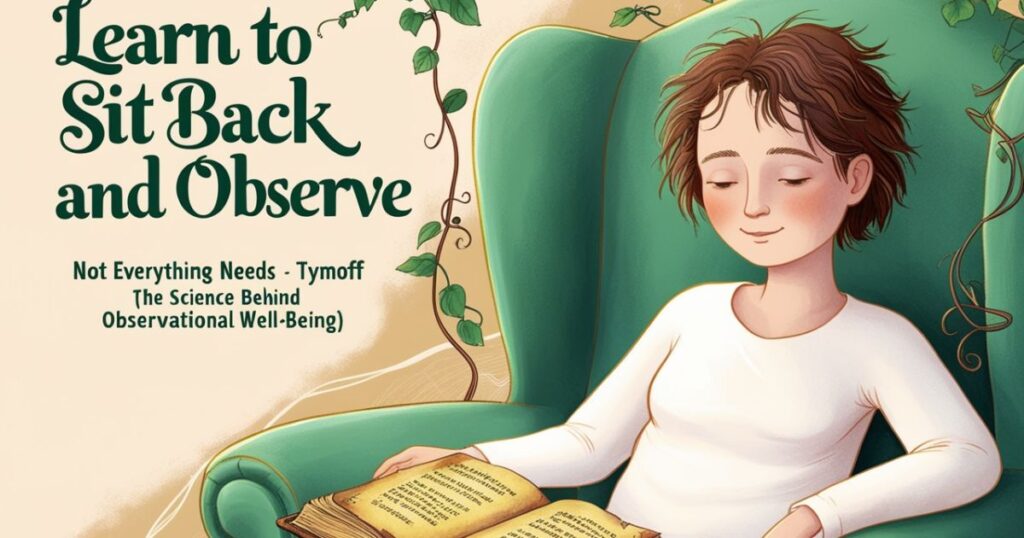In our fast-paced world, we’re often caught up in a whirlwind of constant action. But what if the key to greater understanding and personal growth lies in simply sitting back and observing?
This practice, often attributed to the wisdom of Tymoff, encourages us to take a step back and gain perspective before reacting. Let’s dive into the profound benefits of this often-overlooked practice and explore how it can transform our lives.
Why Observe Without Intervening Is Important
In the hustle and bustle of American life, we’re conditioned to believe that constant action equals productivity. However, the art of observational sitting back challenges this notion, offering a pathway to greater wisdom and clarity. Here’s why it matters:
- Gaining Clarity and Perspective: When we step back from a situation, we allow ourselves to see the bigger picture. This broader view can reveal patterns and connections that aren’t visible when we’re in the thick of things.
- Avoiding Impulsive Reactions: In a culture that often values quick responses, taking a moment to observe can prevent hasty decisions that we might later regret.
- Reducing Stress and Anxiety: The practice of sitting back and observing can significantly lower stress levels. By not feeling pressured to immediately react to every situation, we give ourselves the gift of peace of mind.
- Cultivating Patience and Thoughtfulness: In a world of instant gratification, learning to observe patiently can be a revolutionary act, fostering deeper understanding and more considered responses.
"The observant eye opens the mind to a world of subtle wonders." - Tymoff
What Can Be Learned from Observational Sitting Back

By making a habit of observational sitting back, we open ourselves up to a wealth of insights:
- Deeper Understanding of Complex Situations: We see connections and layers that might be invisible when we’re in the thick of things. For example, in workplace dynamics, observing without immediately intervening can reveal underlying issues that quick fixes might miss.
- Recognition of Unintended Consequences: Without the pressure to act immediately, we can consider the ripple effects of our actions. This foresight is invaluable in both personal and professional decision-making.
- Increased Empathy and Emotional Intelligence: Removing our ego from the equation helps us see other perspectives more clearly, fostering compassion and understanding in our relationships.
- Awareness of Unstated Motivations: We pick up on subtle social cues and body language that reveal hidden drivers in both individuals and groups.
- Lessons for Improving Relationships: By observing interpersonal dynamics, we learn what works (and what doesn’t) in building strong, healthy connections.
- Patterns for Self-Reflection: Observing others can shine a light on our own habits and blind spots, paving the way for personal growth.
- Inspiration for Personal Development: Even seemingly negative situations can be reframed as learning experiences when viewed through the lens of an observer.
Tips for Effective Observational Sitting Back
To truly master the art of observational sitting back, consider these practical tips:
- Adopt a Non-Judgmental Stance: Approach situations with curiosity rather than criticism.
- Notice Details Without Internal Narration: Practice pure observation without the need to commentate mentally.
- Use All Your Senses: Engage fully with your environment, not just visually.
- Suspend Preconceptions: Be open to new interpretations and understandings.
- Be Fully Present: Immerse yourself in the moment without distractions.
- Find Stillness Within Activity: Maintain inner calm even in bustling environments.
- Notice Repeating Patterns: Look for themes and recurring elements in situations.
- Surrender the Need to Fix Everything: Accept that not every situation requires your immediate intervention.
Benefits of Creativity and Innovation

The practice of observational sitting back isn’t just about personal insights—it’s a powerful tool for boosting creativity and innovation. Here’s how:
- Sparking New Ideas: A quiet, observant mind often gives birth to the most innovative thoughts.
- Cross-Pollination of Concepts: Observing diverse situations can lead to unique combinations of ideas.
- Problem-Solving from New Angles: Stepping back allows us to approach challenges with fresh perspectives.
Case Study: The Birth of Post-It Notes
One famous example of innovation born from observation is the creation of Post-It notes. In 1968, Dr. Spencer Silver at 3M was trying to develop a super-strong adhesive. Instead, he accidentally created a weak, pressure-sensitive adhesive.
Rather than discarding this “failure,” Silver observed its unique properties. Years later, his colleague Art Fry realized this adhesive could solve the problem of bookmarks falling out of his hymnal.
Through patient observation and connecting seemingly unrelated ideas, the Post-It note was born—a product that revolutionized office work.
See Also: Wallpaper:y0nv0sjhznu= Naruto: A Journey into the World of Ninja Art
Gaining Different Cultural Perspectives

In our increasingly interconnected world, the ability to understand and appreciate different cultures is invaluable. Observational sitting back is a powerful tool for enhancing intercultural skills:
- Understanding Diverse American Cultures: The USA is a melting pot of cultures. By observing without judgment, we can better appreciate the nuances of different communities within our own country.
- Enhancing Travel Experiences: When visiting new places, taking time to sit back and observe local customs can lead to richer, more authentic experiences.
- Improving Cross-Cultural Communication: By noticing non-verbal cues and social dynamics, we can navigate cultural differences more effectively in both personal and professional settings.
Increased Awareness of Habitual Tendencies
One of the most profound benefits of observational sitting back is the insight it provides into our own behaviors and patterns:
- Identifying Personal Patterns: By stepping back and observing ourselves, we can recognize habitual responses that may not serve us well.
- Breaking Free from Unhelpful Habits: Awareness is the first step in changing behaviors. Observation gives us the clarity to make conscious choices.
- Cultivating Mindfulness: Regular practice of observational sitting back naturally leads to a more mindful approach to daily life.
| Habit | Observation | Potential Change |
| Reactive Anger | Notice physical tension before outbursts | Practice deep breathing when tension arises |
| Procrastination | Observe thought patterns leading to delay | Implement small, immediate actions |
| Negative Self-Talk | Recognize critical inner voice | Develop compassionate self-dialogue |
Improved Community and Social Insights

The practice of observational sitting back can have far-reaching effects on our understanding of community dynamics and social structures:
- Understanding Local Community Dynamics: By observing without immediately intervening, we can gain insights into the complex relationships and power structures within our communities.
- Enhancing Leadership Skills: Great leaders often have a keen ability to observe and understand group dynamics before taking action.
- Building Stronger, More Empathetic Communities: When we take the time to truly observe and understand each other, we lay the foundation for more cohesive and supportive social networks.
Stress Management and Physical Well-Being
The benefits of observational sitting back extend beyond the mental and emotional realms into our physical health:
- Activating the Relaxation Response: The act of sitting back and observing can trigger the body’s natural relaxation response, countering the effects of stress.
- Improving Cardiovascular Health: Regular practice can lead to lower blood pressure and reduced risk of heart disease.
- Enhancing Immune Function: Stress reduction through observation practices can boost the immune system.
- Promoting Better Sleep: A calmer mind and body, cultivated through observation, can lead to improved sleep quality.
The Science Behind Observational Well-Being

Research has shown that practices involving mindful observation, similar to the “sit back and observe” approach, can have significant health benefits:
- A study published in the Journal of Behavioral Medicine found that mindfulness-based stress reduction techniques, which include observational practices, led to improvements in both physical and psychological symptoms across a wide range of conditions.
- Neuroscientific research has demonstrated that regular mindfulness practices can actually change the structure and function of the brain, particularly in areas related to attention, emotion regulation, and self-awareness.
Conclusion: The Art of Balanced Living
In a world that’s always demanding action, learning to sit back and observe is more than just a skill—it’s an art form. It’s not about being passive; it’s about being thoughtful and intentional.
By resisting the urge to jump in and fix everything immediately, we open ourselves up to deeper understanding, reduced stress, and a more balanced approach to life.
The wisdom encapsulated in Tymoff’s phrase, “Learn to sit back and observe, not everything needs your reaction,” is more relevant than ever in our fast-paced, high-stress world. It reminds us that sometimes, the most powerful move is to be still and watch.
So the next time you feel the pressure to act, take a breath. Sit back. Observe. You might be surprised at the wisdom, clarity, and peace of mind you gain. In doing so, you’re not just improving your own life—you’re contributing to a more thoughtful, empathetic, and balanced world.
Key Takeaways:
- Observational sitting back enhances clarity and perspective in complex situations.
- It fosters empathy, creativity, and innovation.
- The practice improves cultural understanding and social insights.
- It contributes to better stress management and overall physical well-being.
- Regular observation leads to increased self-awareness and personal growth.
Remember, in the words often attributed to Tymoff, “Not everything needs your reaction.” By learning to sit back and observe, you’re equipping yourself with a powerful tool for navigating life’s challenges with grace, wisdom, and balance.

Hello, I’m Matthew, an author at GenRealRedar, where I explore the dynamic worlds of Lifestyle, Tech, Gaming, and Travel. My articles are designed to offer insightful and engaging content, breaking down complex topics into easily digestible reads for a broad audience. Stay tuned on GenRealRedar.com for fresh perspectives and the latest updates on all things tech, lifestyle, and beyond.

